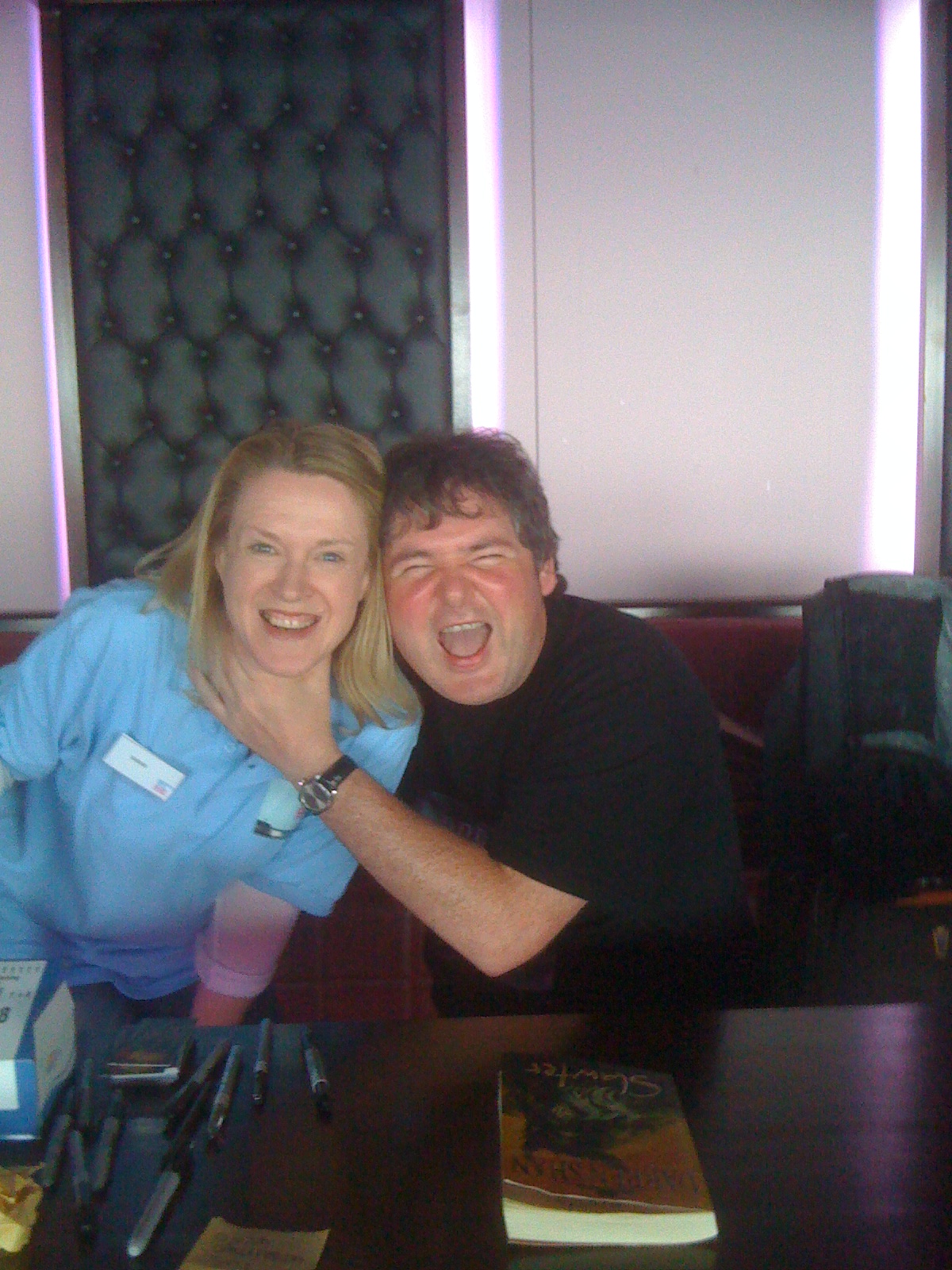I’m on day three now of the first rewrite of The Shoestring Proposal (adult novel for 2012 – working title), and it was all going along nicely until I hit a major plot hiccup and had to start all over again.
I’m trying to focus on the overall structure of the story this time but it’s very tempting to tweak at the dialogue and the sentences too. I’ve gone over the first six chapters about five times now and it’s time to let go and move on to the next section of the book. I’ll come back to the first section again later and then start the whole process all over again!
But rewriting is an interesting process. To give you some idea of what I’m up to, below is a short section of a scene from near the opening of the book, with notes (in italics) as to why I’ve added or changed things.
Read it if it interests you. I’ve given you both the original version and the new version.
But first - Other things I’m working on during the rewrite – some of these are minor, some are big:
Changing the name of a secondary character from Rebecca to Jessica – I had a Rachel and a Rebecca – mother and daughter, and I was getting confused as to who was who – so I’m sure a tired reader might confuse them also.
Making my main characters – Jules and Pandora – stand out more. Adding lots of detail – clothes, mannerisms, giving them each a very particular way of speaking. A lot of this was in the first draft, but it wasn’t consistent enough. It needs to be perfect.
Making sure I’ve got all the continuity correct – Pandora was 14 when her mum died, Jules, nine; birthdays; childhoods. Is this all consistent throughout the book?
Upping the drama – making the reader FEEL is vitally important in popular fiction. Have I made the most of each and every scene?
Fact checking – lots of fact checking. I need to talk to a medic for a start – luckily I have a friend who’s a surgeon who will be able to help me. All the facts need to be 100% accurate.
Adding a rabbit (don’t ask).
Making Pandora’s meltdown BIGGER.
Putting in two new scenes – taking out other scenes, ones I know are not working.
And that’s just for starters – once my agent and my editor get their hands on it, the work really begins! Fun, fun, fun. But all part of every writer’s life.
At the end of the day, the more work you put into a book, the more love and passion and enthusiasm your pour into the pages, the better it will be.
The Shoestring Proposal (First Draft)
Old version: (Bits in talics are my notes)
I knew I’d get a mixed reaction when I first suggested the trip to Paris.
(I deleted this line as I want the Paris bit to come as a surprise to the reader.)
I’m standing behind the till at Shoestring, the second hand designer shop I run, along with my sister, Jules, and Bird, our spritely eighty-four-year-old granny. It’s a quiet day and Jules has wandered over for a chat.
(all a bit bla – needed more of a sense of who Jules and Pandora actually are – and I haven’t actually given Pandora a name - I want the reader to know her name early on as she’s the narrator)
‘Have you thought any more about your birthday present?’ she says without preamble, leaning over and plonking her elbows down on the desk. ‘How about hand-made leather gloves? There’s little place in town that makes them to measure and you can choose the leather and the lining. I know you like practical presents and it’s something a bit different. I’m not giving you a voucher again, not for your thirtieth.’
It’s now or never, I decide.
‘I’d much prefer a weekend away, Jules,’ I say, trying to keep my voice light. ‘How about Paris?’
She twists around and stares at me. ‘Paris? Are you sure?’
She has every right to be surprised. I’d spent three months studying at the Paris Institute of Fashion and Design in Montmartre in my early twenties and I’d come home with a lot more than notebooks jammed with dress ideas, and conversational French.
OK problem here – Paris is a big deal – Pandora left Paris in a hurry and has never been back – so wanting to go there for her 30th is a HUGE deal – which isn’t clear her – and also would stop the conversation – it wouldn’t just be – Paris . . . Jules in shock . . . then back to the previous conversation – wrong, wrong, wrong!
I nod. ‘I’d prefer to be out of the country when I turn thirty. That way I can pretend it isn’t really happening. Thirty’s so ancient. I can feel the crow’s feet coming on already.’ My hands flutter to the outer edges of her eyes and I start rotating the skin gently under my finger tips.
New version:
(Second draft - and still a long way to go yet!)
I’m sitting behind the till at Shoestring, the second hand designer clothes shop I run, peering at the computer screen when my sister, Jules wanders in the front door pushing her road bike in front of her with one hand. She’s only ten minutes late which isn’t bad for her.
My mind’s all over the place this morning; I’m supposed to be updating our website before the shop floor starts to get too busy – adding new stock and taking down anything we’ve sold - but I’m finding it desperately hard to concentrate, so I’m glad for the distraction.
‘Hey, Pandora, have you thought any more about your birthday present?’ she says without preamble, propping her bike against the desk, swinging her bag off her shoulder and dumping it the floor, and then leaning over and plonking her elbows down on the desk, making the bracelets on her wrist jangle down her arm. She’s wearing a very odd-looking outfit today – nothing new for Jules – red knitted leggings, yellow cut-off denim shorts and a purple bat-winged top.
‘I had an idea on the way over,’ she continues, oblivious to either my stares at her get up or the fact that she’s late for work. ‘How about hand-made leather gloves? There’s little place in town that makes them to measure and you can choose the leather and the lining. I know you like practical presents and it’s something a bit different. I’m not giving you a voucher again, not for your thirtieth.’
I’ve been mulling over how to work my birthday into a conversation for a good week and now that Jules has given me the opening, I may as well get it out there.
Trying to sound as breezy as possible I say ‘I’d much prefer a weekend away than a present, Jules. A city break maybe. I’d like to be out of the country when I turn thirty. That way I can pretend it isn’t really happening. Thirty’s so bloody ancient. I can feel the crow’s feet coming on already.’ I start to rotate the skin at the corner of my eyes gently under my finger tips. ‘You have to massage your face several times a day, apparently,’ I add, trying to make my ageing-concern believable. ‘And do special exercises.’
It still isn’t perfect, but it’s a hell of a lot better than it was. Several more rewrites and I might actually be brave enough to show it to my agent. Maybe . . .
Right, back to work.
Yours in writing,
Sarah XXX







